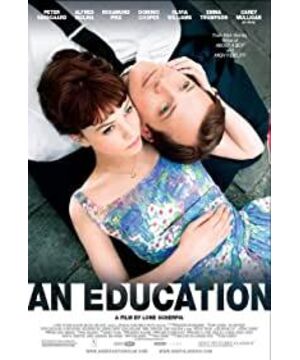[Growing Education] The story comes from the memoirs of Lynn Barber, a female contributor to the Guardian's "Observer" column. Before the filming started, "Variety" magazine had rated it as "unfilmed in 2007". One of the best British screenplays", but in the oriental perspective of today's reality, people can't help but ask the first question, it's not "Xi Bao" that an innocent 16-year-old girl was abducted by a multi-gold strange uncle That set, what's new?
Yes, the [Growing Up Education] story is pretty old-fashioned. It was in London in the 1960s. The girl Jenny grew up in an ordinary family with a little side to the middle class. In order to get closer to the middle class and even the upper class, her father made a strict education plan for her. Oxford, have hobbies - in case the interviewer asks, and be cooperative - at least one "show" with an orchestra. Until she met the handsome and rich middle-aged David, Jenny was taken into a dream world by him: listening to real concerts, participating in art auctions, going to Oxford, visiting Paris... He even proposed to her - a little flirting For a moment, the audience wondered about his motives all the way, but the dream came to an abrupt end with the fact that Jenny found out that he had a family.
The story is old-fashioned and old-fashioned, but it is more important to substitute the author's perspective of memory and reflection. On the surface, the film took an entire hour to show how many good times David brought to Jenny, but viewers who have a little knowledge of the "weird uncle mode" will easily see that this is actually a bittersweet memory of the original author—— There is actually no so-called love between David and Jenny, only the relationship of hunting and taking. From the beginning to the end, David gave Jenny only two things: material upgrades and challenges to the bottom line; Jenny asked David for only one thing: a "Mr. Rochester" fantasy. We see that David accurately sees Jenny's needs, repeatedly anesthetizes her with "have fun in life", and even wants to use bananas to save Jenny's "first time" trouble. The act of proposing is to find out that Danny is interested in Jenny The policy of responding when there is an attempt, and even disappeared after Jenny discovered the truth... David is a middle-aged man who emphasizes quick and effective strikes in the middle. He has too many similar cases, never " Difficult girls waste time, and Jenny, who is immersed in fantasy, can't find the mystery behind David's gentle behavior, but falls into the whirlpool of lying and taking the blame for him again and again. The more beautiful the picture of the two of them getting along, the more ironic the protagonist of the memory is. David said, "No matter what I pour for you, you can drink it up, then smash the glass on the bar and ask for another drink. That's great" makes Jenny in the picture feel very complacent and easily forgives him for stealing. It also makes people feel the author's cold eyes behind the screen in his current state of mind: Why was I so stupid in the first place? ——Therefore, many young women who are addicted to or once owned by the "uncle control" resonated and moved. There are too many young and beautiful Jenny in this world, and there are too many handsome and rich David. Such stories are in today's world. In reality, it is still widely staged. [Growth Education] provides a model with accurate emotions, unlike the chaos of values in "Xibo".
But [Growth Education] is not just a cliché of "unreliable strange uncle" and "women's independence". On the surface, it uses a simple dualism to separate Jenny's "wrong way". In the last 15 minutes of the film, Jenny repents and completely Denying love and material things with David, and re-reading the book with a footnote of "there are no shortcuts in life", until finally I was admitted to Oxford and ended... The denial of "shortcuts" here makes the theme of the film seem very subtle, connecting with the original book The author Lynn is now in the company of celebrities, and the life of the fashion cocktail party seems to make people feel that whether it is to hook up with a strange uncle or to study hard, the ultimate goal is Chinese clothing, gourmet food, upper class, and Paris. However, the branch handling of Jenny's parents can reveal a little bit of the author's conflicting mentality - when the handsome David arrives in a famous car, is willing to spend a lot of money for their daughter, and is willing to marry their daughter, the two adults put "Oxford" The two words were thrown faster than Jenny, so after finding the truth, Jenny said, "Stupid little girls are always bewitched by older men, what were you doing back then?" Willful anger and shirk responsibility, but the author's helpless criticism of the class consciousness and women's values of the entire era after years of reflection and unable to refute it.
This allows us to return to the issue of "education". Back at the beginning of the film, along with subtitles and music, we see girls of Jenny's age walking with books on their heads, practicing manners, taking ballroom dancing classes, and learning to do Cake's home economics class points to the needs of women in the context of a patriarchal society, rather than the reflection of women's self-worth. What does education really mean for girls? You start thinking, and the film succeeds.
Originally published in "Watching the Movie", February 2010
View more about An Education reviews











